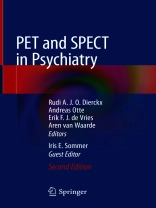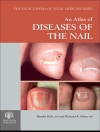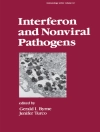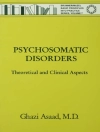This book provides a comprehensive overview of the use of PET and SPECT in the classic psychiatric disorders such as depression, bipolar disorder, anxiety disorders, and schizophrenia. In addition, it discusses the application of these functional neuroimaging techniques in a variety of other conditions, including sleep disorders, eating disorders, autism, and chronic fatigue syndrome. The new edition has been extensively revised and updated to reflect the latest advances and results in nuclear imaging within the field. Most chapters are written jointly by a clinical psychiatrist and a nuclear medicine expert to ensure a multidisciplinary approach. This state of the art compendium will be of value for all who have an interest in the field of neuroscience, from psychiatrists and radiologists/nuclear medicine specialists to interested general practitioners and cognitive psychologists. Companion volumes on the use of PET and SPECT in neurology and for the imaging of neurobiological systems complete a trilogy.
Inhaltsverzeichnis
PART I BASICs: Neuroimaging in Psychiatric Drug Development.- PET Quantification in Neuropsychiatry.- The Role of P-Glycoprotein in Psychiatric Disorders .- PART II DEPRESSION AND RELATED DISORDERS: Molecular Imaging of Depressive Disorders .- Functional Imaging of Suicidal Behavior .- SPECT and PET in Late-Life Depression .- Neuroimaging in Seasons and Winter Depression .- Bipolar Disorders.- Psychiatric Complications of Parkinson’s Disease .- Psychiatric Disorders in Dementia .- PART III ANXIETY DISORDERS: PET and SPECT studies in Anxiety Disorders.- Neurobiology of Posttraumatic Stress Disorder.- Neuroimaging in PTSD-Related Psychotherapies.- Obsessive-Compulsive Disorders.- PART IV PSYCHOSIS AND COGNITIVE DISORDERS : Dopamine and Response to Antipsychotic Medication.- Cholinergic Imaging in Psychosis.- Molecular Imaging in Schizophrenia Spectrum Disorders.- Neuroimaging Findings in Patients with Hallucinations.-TSPO Imaging in Psychiatric Disorders.- Neuroimaging Findings in Delirium.- PART IV IMPULSE CONTROL AND RELATED DISORDERS : PET and SPECT in Personality Disorders.- Abnormalities of Neurotransmission in Drug Addiction.- Molecular Imaging Studies in Stimulant Addiction.- SPECT and PET in Eating Disorders.- Impulsivity Imaging.- Brain SPECT in Behaviorally Disordered Dogs.- Imaging of Neurotransmitter Systems in Obesity.- Neuroimaging Studies of Psychopathy.- Neurobiology of Aggression (Imaging Findings).- PART VI MISCELLANEOUS SUBJECTS : PET and SPECT in Autism Spectrum Disorders.- PET and SPECT Imaging in ADHD.- SPECT and PET Imaging of Apathy.- Molecular Imaging in Chronic Fatigue Syndrome.- PET and SPECT in Sleep Disorders.- PET of Non-Pharmacological Interventions for Psychiatric Disorders.
Über den Autor
Rudi Dierckx studied medicine and neuropsychiatry at the Free University of Brussels. He was trained as a nuclear medicine physician at the University of Antwerp (1988-1994). Rudi has headed the Department of Nuclear Medicine at the University Hospital of Ghent (Belgium) from 1994 to 2004, and has acquired a Master of Business Administration (MBA) at the Vlerick School of Management in Leuven (2004, cum laude). Since 2005 he is Head of the Department of Nuclear Medicine and Molecular Imaging at University Medical Center Groningen (UMCG) in The Netherlands. Since 2013, he is also Head of the Medical Imaging Center, and Chairman ad interim of the Department of Radiology at UMCG. His primary research interests are PET studies of the human brain.
Andreas Otte, MD, is a board-certified specialist in Nuclear Medicine and Professor of Biomedical Engineering in the Division of Medical Engineering, Department of Electrical Engineering, Medical Engineering and Computer Science, Offenburg University, Germany. Prof. Otte received his graduate and post-graduate medical education at the University Hospitals Freiburg, Germany, and Basle, Switzerland, and at the Paul Scherrer Research Institute in Villigen, Switzerland. Thereafter he held various leading positions in clinical research with Pfizer in Freiburg, Germany (International Medical Research, Pfizer Global Pharmaceuticals) and at the University Hospital Freiburg. From 2002 to 2009 he was Visiting Professor of Nuclear Medicine in the Medical Faculty of the University of Ghent in Belgium. He took up his present position in 2010. Andreas Otte is the author of many peer-reviewed journal articles and the author or editor/co-editor of a number of books. His research focus is on neurosciences including functional neuroimaging, brain-machine-interfaces, and intelligent neuroprosthetics. Awarded a series of international scientific prizes, he was nominated Editor of the Board of the European Journal of Nuclear Medicine (1998-2003) and the Hellenic Journal of Nuclear Medicine (since 2003).
Erik de Vries graduated in chemistry (cum laude) at the University of Leiden (The Netherlands) in 1991 and obtained his Ph D in natural sciences at the same university in 1995. After a short project as a chemist at the pharmaceutical company Gist-Brocades in Delft, the Netherlands, he moved to the University Medical Center Groningen in 1996, where he is still working as an Associate Professor at the Department of Nuclear Medicine and Molecular Imaging. Since 2007, he is the research coordinator of this department. Erik was also guest lecturer in molecular and diagnostic imaging at the University Sapienza in Rome, Italy from 2007 to 2013. He has a special interest in the development and application of radiopharmaceuticals for PET imaging of inflammation and tumor drug targets.
Aren van Waarde studied animal physiology and received a Ph D degree from Leiden University inthe Netherlands. He worked as a postdoctoral research associate in the Department of Molecular Biophysics and Biochemistry at Yale University (1986-1988). After his return from the US, he was appointed in Leiden as a Fellow of the Royal Dutch Academy of Sciences and worked on in vivo NMR spectroscopy of aquatic animals. For this research he received an award (C.J.Kok prize, Leiden University). Since 1991 he is a member of the permanent staff of the Department of Nuclear Medicine and Molecular Imaging (formerly: PET Center) at the University Medical Center Groningen (Netherlands), and is involved in the preclinical evaluation of novel radiopharmaceuticals. His primary research interests are PET studies of receptors in the brain and the use of PET to examine the mechanism(s) of action of CNS drugs.
Iris Sommer studied medicine in Amsterdam and Public Health in Maastricht. She obtained her Ph D cum laude at University Utrecht in 2004 on brain imaging in schizophrenia. In 2011, Sommer was appointed Professor of Psychiatry at the University Medical Centre Utrecht, where she initiated the Voices Clinic. Currently, she is professor of cognitive aspects of neurological and psychiatric disorders at the Departments of Neuroscience in UMCG. Since 2016, she is visting professor at the Norwegian Center of Excellence, university of Bergen, department of medical and biological psychology. She received a Veni, Clinical Fellowship, Vidi and TOP grant from Zon MW and recently a large grant to study effects of antipsychotic maintenance treatment in early psychosis. Professor Sommer was elected as a member of the Young Academy of the KNAW (Royal Dutch Academy of Sciences) and is a member of the Permanent Committee for Large Research Infrastructure at NWO. She is consultant to GABATHER, a small company developing new GABAergic treatment for psychiatric disorderd and a member of the Dutch Committee for Research Integrity (LOWI). She is associate editor of Schizophrenia Bulleting, Psychological Medicine and the Dutch Medical Jorunal (NTVG).












